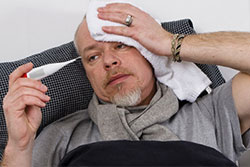Attention A T users. To access the menus on this page please perform the following steps.
1. Please switch auto forms mode to off.
2. Hit enter to expand a main menu option (Health, Benefits, etc).
3. To enter and activate the submenu links, hit the down arrow.
You will now be able to tab or arrow up or down through the submenu options to access/activate the submenu links.
Locator
Contact
Search
Treatment of Flu

Knowing what to do if you get the flu may help you feel better sooner and prevent others from becoming sick.
If you get the flu
- Stay home and rest.
- Drink fluids.
- Take medicines for fever such as acetaminophen or ibuprofen.
- Clean your hands often.
- Cover your coughs and sneezes.
- Call your health care provider within 48 hours for advice about what to do next. Antiviral medicines may reduce flu symptoms if started within 48 hours of your first symptoms.
Helpful supplies
If you do become sick and medical attention isn't necessary, these supplies can make managing the flu a little easier:
- Thermometer
- Fever reducers such as acetaminophen (for example, Tylenol®) or ibuprofen (for example, Advil® or Motrin®)
- Cough drops or cough syrup
- Drinks: water, fruit juices, soda, tea, or fluids with electrolytes (Gatorade® or Pedialyte®). Avoid caffeine.
- Light foods: clear soups, crackers, and applesauce
- Blankets or warm covers
- Face masks and disposable gloves
Caring for a person with flu
- Know common flu symptoms and when to seek medical care.
- Have the sick person rest and lie down if running a fever.
- Allow the sick person to judge what bed covers are needed. When fever is high the person may feel very cold and want more blankets.
- Use fever reducers such as acetaminophen or ibuprofen. Follow the package label or your health care provider's direction to reduce fever, headache, and muscle, joint, or eye pain.
- Allow the sick person to drink as much as he or she can.
- Give light foods as the person wants. Fluids are more important than food in the first days when the fever may be highest.
- Do not smoke around a sick person.
- Have the sick person gargle. Use lozenges or hard candy for a sore throat.
- Clean your hands before and after caring for a sick person, and after coughing or sneezing. Sick people should clean their hands too.
- Avoid touching your eyes, nose, or mouth. Germs often spread this way.
- Consider wearing a mask when giving care to a sick person.
When to seek medical care
Call your health care provider within 48 hours if you or someone else with the flu:
- Has common flu symptoms
- Has these symptoms:
- Not able to drink enough fluids. Dark urine or feeling dizzy when standing are signs of not enough fluids.
- Fever of 100°F or higher for 3 or more days
- Feels better, then gets a fever or sore throat again
Go right away for medical care if you or someone else with the flu has:
- Shortness of breath or wheezing
- Coughs up blood
- Pain or pressure in chest when breathing
- Chest pain, especially if have heart disease like angina or congestive heart failure
- Trouble with balance, walking or sitting up, or becoming confused
Brand names are provided as examples only. It does not mean that these products are endorsed by VA or any other Government agency. Also, if a particular brand name is not mentioned, this does not mean or imply that the product is unsatisfactory.






















